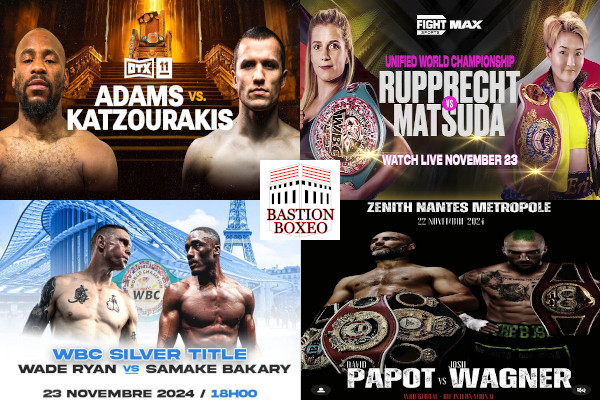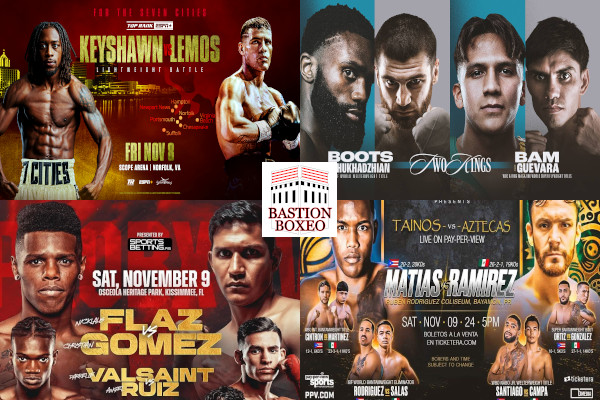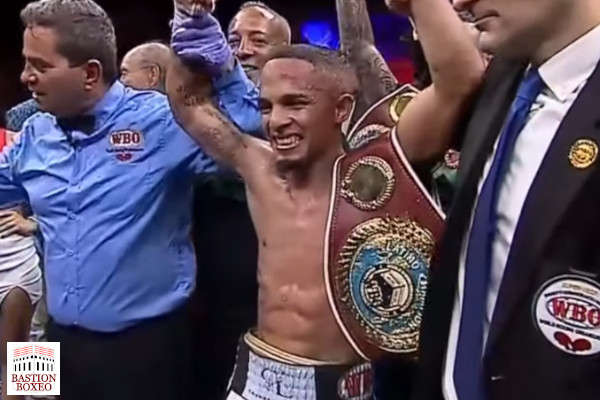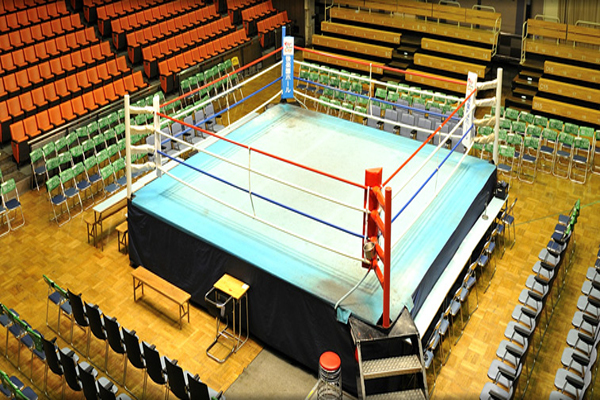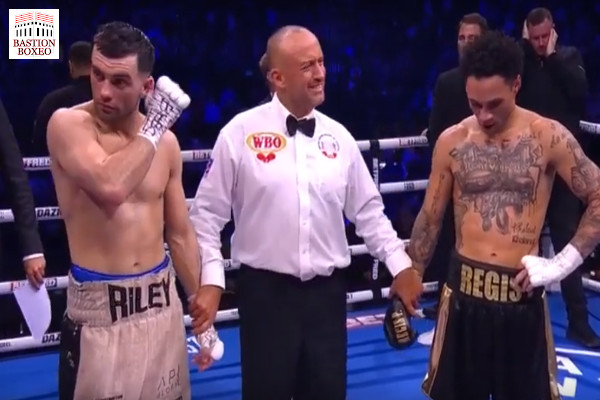Razones económicas para entender por qué Jermall Charlo no es desposeído por el WBC pese a sus dos años de inactividad
Daniel Pi
@BastionBoxeo
Entre sus incontables faltas y decisiones cuestionables, el WBC se ha caracterizado por, en bastantes ocasiones, mostrarse increíblemente permisivo con la falta de defensas obligatorias y con la inactividad de sus campeones mundiales.
Hay que tener en cuenta que si el sistema de rankings y eliminatorias funciona bien, y a veces incluso cuando funciona mal, el aspirante obligatorio puede ser un boxeador de un nivel altísimo que supone un reto excepcional para el monarca. En este sentido se debe recordar que boxeadores como Oleksandr Usyk, Terence Crawford, Errol Spence, Gennadiy Golovkin, Artur Beterbiev, Dmitry Bivol, etc. fueron aspirantes obligatorios en uno de los organismos antes de lograr sus primeros títulos mundiales.
Por ello, las defensas obligatorias han resultado una molestia para el WBC cuando tiene intención de mantener a un monarca en su posición: por un lado tiene que fingir que es un organismo respetable y que prioriza los grandes combates, por lo que no puede permitir que los aspirante obligatorios tengan un nivel muy bajo, pero por otro lado, no quiere arriesgarse a que ciertos boxeadores se vean en peligro de perder su corona. Es por ello que incluso se ideó la abyecta solución del campeón franquicia.
Más allá de esta idea repulsiva, la solución más fácil para el WBC es no ordenar durante años defensas obligatorias y ni siquiera amagar con desposeer a ciertos titulares que se mantienen inactivos. A veces, este tipo de conducta parece obedecer a motivos que entran en la esfera de juego de poder, tratos de favor, intereses extradeportivos, etc. Pero en otras ocasiones, la causa es simplemente el deseo de ganar más dinero.
Para entender mejor este aspecto que casi nunca se trata públicamente en el boxeo, vamos a tomar como ejemplo al monarca mundial WBC del peso medio Jermall Charlo, que pese a no haber defendido su título desde hace cerca de dos años, sigue manteniendo su posición. De hecho, hace unos días el presidente del Consejo Mauricio Sulaimán tuvo la desfachatez de admitir que no piensa desposeer a Charlo y que el boxeador tiene todo su apoyo.
Dejando de lado la posibilidad real de que pudiese haber un entendimiento secreto entre el WBC y PBC, las razones puramente económicas ponen de manifiesto por qué le resulta más rentable al organismo mantener a un campeón inactivo que permitir que un nuevo aspirante se corone y defienda el cinturón. Veamos los datos.
El monarca mundial Jermall Charlo declaró oficialmente 1.500.000 de dólares como bolsa para su última pelea (los boxeadores reciben pagos legales de sus promotoras que no se contabilizan como bolsas). Hay que recordar, que los organismos en general se quedan con el 3% de la bolsa del campeón, por lo que el WBC extrajo en solo un combate de Charlo 45.000 dólares. Si sumásemos a esto la anterior bolsa de Charlo, que fue de 1.000.000, y de la que el WBC se quedó 30.000, nos daría 75.000 dólares para el Consejo en sólo dos enfrentamientos.
Si miramos quién es su aspirante obligatorio, éste es el dominicano Carlos Adames, que en su último encuentro (ante Montiel con título interino en juego) sumó una bolsa de 100.000 dólares. Esto supone que si Adames sustituyese a Charlo como monarca mundial WBC del peso medio, el organismo sólo ganaría 3.000 dólares por pelea. Es decir, Adames tendría que disputar 16 combates para que al WBC le saliese más rentable el reinado de éste que una sola defensa de Charlo, y 25 combates para igualar lo que extrajo el WBC con dos defensas de Charlo.
En otras palabras, a dos peleas por año de media que realiza un monarca mundial normal, Adames tendría que reinar durante ocho años para que al WBC le saliese más a cuenta tenerlo a él como monarca que mantener a Charlo peleando una sola vez cada dos años. Lógicamente, si el reinado de Adames se prolongase en el tiempo y su nivel de oposición aumentase, también lo harían sus bolsas, y la diferencia no sería tan grande. Pero no se debe perder de vista que el potencial de lograr mayúsculas bolsas de Charlo es enormemente superior al de Adames.
Si lograse la mejor racha imaginable, sin tropiezos (algo que parece muy improbable) y prolongadamente, a largo plazo Adames podría llegar a ser una estrella y quizás sus bolsas fuesen notables. Pero ahora mismo, Charlo sólo necesitaría enfrentarse a otro de los púgiles destacados de la compañía para que sus bolsas fuesen mucho más allá del 1.500.000 dólares, debiéndose tener en cuenta que 2.000.000 de dólares de bolsa supondrían para el WBC 60.000 dólares, 3.000.000 de dólares supondrían 90.000 dólares para el organismo y así sucesivamente. Por último no se debe perder de vista que ahora mismo el WBC extrae porcentajes tanto de las bolsas del campeón Charlo como del titular interino Adames, por lo que en este escenario maximiza sus ganancias y tiene un seguro pase lo que pase en el futuro.
Los números arriba expuestos ilustran claramente cuál es el motivo de que haya campeones a los que se les permite mantenerse inactivos indefinidamente, a los que nunca se les ordena que afronten defensas obligatorias o para los cuales se acepta un permiso especial para que un boxeador a medida sea considerado el retador obligatorio.
De nuevo, las malas prácticas de los organismos no necesitan llevarse a cabo con dinero en la sombra y transacciones oscuras en paraísos fiscales: las características públicas, legales y oficiales del boxeo, si son retorcidas lo suficiente, permiten que los organismos puedan enriquecerse lícitamente sin que se les pueda llevar a juicio. Y es que, aunque una persona puede ver en ello corrupción flagrante, Mauricio Sulaimán alega solamente humanidad y el deseo de darle una oportunidad a un Jermall Charlo que lo está pasando mal, siendo amparado el presidente por las normas de su organismo que (como en las demás organizaciones) le dan en última instancia el derecho a tomar cualquier decisión arbitrariamente.
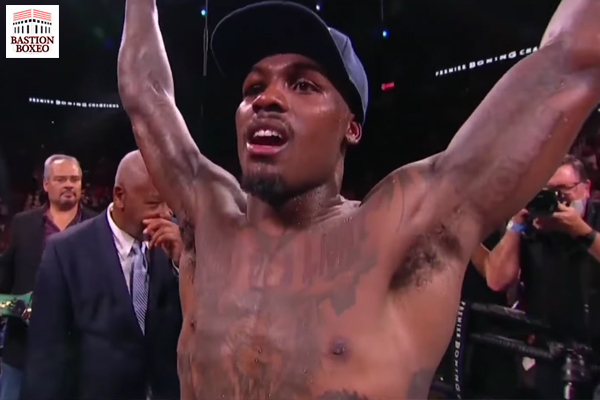
Economic reasons to understand why Jermall Charlo is not stripped of his belt by the WBC despite his two years of inactivity
Daniel Pi
@BastionBoxing
Among its countless questionable decisions, on many occasions the WBC has been incredibly lax with the mandatory defenses and the inactivity of its world champions.
It must be taken into account that if the rankings and eliminators system works well, and sometimes even when it works poorly, the mandatory challenger can be a boxer of a very high level who represents an exceptional challenge for the monarch. In this sense, it should be remembered that boxers like Oleksandr Usyk, Terence Crawford, Errol Spence, Gennadiy Golovkin, Artur Beterbiev, Dmitry Bivol, etc. were mandatory challengers in one of the organizations before conquering their first world titles.
For this reason, the mandatory defenses have been a nuisance for the WBC when the organization intends to keep a champion in his position: on the one hand, it has to pretend that it is a respectable organization and that it prioritizes big fights, so it cannot allow mandatory challengers of a very low level, but on the other hand, the sanctioning body don’t want to put certain fighters in danger of losing their crown. That is why the abject solution of the franchise champion was devised.
Beyond this repulsive idea, the easiest solution for the WBC is not to order mandatory defenses for years and not even threaten to strip certain inactive champions. Sometimes, the reason behind this type of behavior seems to be in power games, favorable treatment, interests beyond sports, etc. But at other times, the cause is simply the desire to earn more money.
To better understand this issue, that is almost never discussed publicly in boxing, let’s take the WBC middleweight champion Jermall Charlo as an example, boxer who despite not having defended his title for nearly two years, continues to maintain his position. In fact, a few days ago the WBC president Mauricio Sulaimán had the audacity to admit that he does not intend to strip Charlo and that the boxer has his full support.
Leaving aside the real possibility that there could be a secret understanding between the WBC and PBC, the purely economic reasons show why it is more profitable for the sanctioning body to keep an inactive champion than to allow a new challenger to become titlist and defend his belt. Let’s look at the numbers.
World champion Jermall Charlo officially declared $1,500,000 as a purse for his last fight (boxers receive legal payments from their promoters that are not counted as purses). It must be remembered that organizations in general keep 3% of the champion’s purse, which is why the WBC extracted $45,000 in just one Charlo fight. If we add to this Charlo’s previous purse, which was $1,000,000, and of which the WBC kept $30,000, that would give us $75,000 for the organization in just two bouts.
If we look at who is his mandatory challenger, this is the Dominican Carlos Adames, who in his last match (against Montiel with an interim title at stake) earned a purse of $100,000. This means that if Adames replaced Charlo as the WBC world middleweight champion, the organization would only earn $3,000 per fight. That is to say, Adames would have to fight 16 bouts for his reign to become more profitable for the WBC than a single defense of Charlo, and 25 fights to equal what the WBC earned with two defenses of Charlo.
In other words, at an average of two fights per year for a normal world champion, Adames would have to reign for eight years for the WBC to have more profits with him than with Charlo fighting once every two years. Logically, if Adames’ reign lasted and his level of opposition increased, so would his purses, and the difference would not be so great. But it should be kept in mind that Charlo’s potential for earning huge purses is vastly superior to Adames’.
If he were to have the best and longest run imaginable, without setbacks (which seems highly unlikely), Adames could eventually be a star in the long run and perhaps his purses would be remarkable. But right now, Charlo would only need to face another of the company’s big names for his purse to go well beyond $1,500,000. And a $2,000,000 purse would earn the WBC $60,000, while a $3,000,000 purse would mean $90,000 for the organization, and so on. Lastly, its important to highlight that right now the WBC extracts percentages from both the purses of the champion Charlo and the interim belt holder Adames, so in this scenario it maximizes its profits and secures money no matter what happens in the future.
These numbers clearly show why there are champions who are allowed to be inactive indefinitely, are never ordered to face mandatory defenses, or who receive a special permit so as tailor-made opponents are accepted as the mandatory challengers.
Again, the bad practices of the organizations do not have to be carried out with shadow money and shady transactions in tax havens: the public, legal and official characteristics of boxing, if twisted enough, allow the organizations to legally enrich themselves without the risk to end in trial. Although a person can see flagrant corruption in it, Mauricio Sulaimán alleges only humanity and the desire to give a chance to Jermall Charlo, who is having a bad time, the president being protected by the rules of his organization which (like in the other sanctioning bodies) ultimately give him the right to make any decision arbitrarily.


